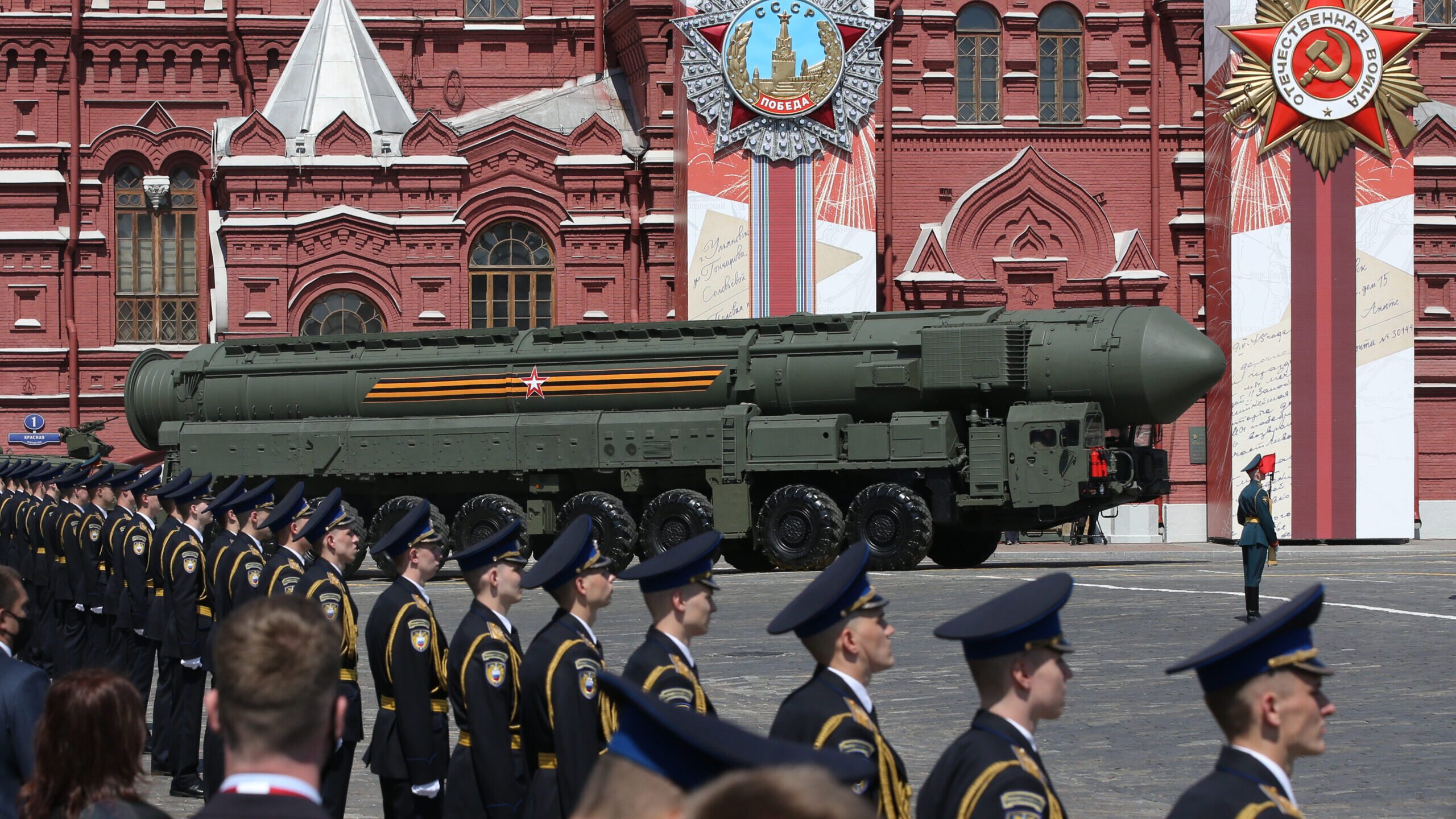THERESA HITCHENS

WASHINGTON — The Biden administration’s new nuclear and missile defense reviews, released in unclassified format today, both double down on the widespread view in Washington that the strategic threats to the US homeland from China and Russia are growing — thus raising the criticality of both US nuclear forces and missile defenses to deterring future conflict.
“We recognize that the international security environment has deteriorated since 2018,” when the previous Nuclear Posture Review was released by the Trump administration, a senior Defense Department official told reporters ahead of the official document rollout.
“Russia’s invasion of Ukraine is a stark reminder of nuclear risk in contemporary conflict. And China’s nuclear modernization and its rapid expansion presents us with new risks and uncertainties. In the coming years, for the first time, we’ll have to deter two major nuclear competitors, both Russia and China. This presents new dilemmas for both strategic deterrence and for regional warfighting,” the official elaborated.
Previously, both documents — formally the Nuclear Posture Review and the Missile Defense Review — were developed sideways to the broader National Defense Strategy, which resulted in situations such as when the Trump administration’s NPR came out a year before the MDR did. For the first time, the official stressed today, the two documents were developed in parallel with the National Defense Strategy, which allowed a more integrated approach to issues such as deterrence and risk management. That broader strategy also was released in unclassified form today, although all three classified versions were sent to Congress in March.
In early reactions, both reviews were largely welcomed by more hawkish commentators and criticized by supporters of more robust approaches to nuclear arms control — with the latter lamenting that Biden has essentially walked away from the Democratic Party’s 2020 presidential platform and his own campaign promises to reduce US reliance on nuclear weapons.
Nuclear Posture Review: Same As It Ever Was
“The fundamental role of nuclear weapons is to deter nuclear attack on the United States, our allies and our partners. The United States would only consider the use of nuclear weapons in extreme circumstances to defend the vital interest of the United States or its allies and partners.”
“The Nuclear Posture Review establishes a strategy that relies on nuclear weapons to deter all forms of strategic attack. This includes nuclear employment of any scale, and includes high consequence attacks of a strategic nature using non-nuclear means,” the senior DoD official said.
The NPR “fully” commits the administration to modernizing the nuclear triad, and the aging nuclear command, control and communications infrastructure. Modernization programs, the document notes, include the Columbia-class nuclear submarine, the Minuteman III intercontinental ballistic missile (ICBM) replacement, the new air-launched Long-Range Standoff (LRSO) cruise missile and nuclear-weapon equipped F-35 fighters to be deployed in Europe.

The NPR “fully” commits DoD to modernization of the nuclear triad, and NC3 capabilities — and leaves open potential nuclear weapons use against non-nuclear strategic threats.
The Pentagon has requested some $30 billion in fiscal 2023 for nuclear modernization, and that funding is only going to increase in future years.
“That number continues to go up as we hit this bow wave, which is really a result of under-investing over many decades, and realizing that now we have to modernize [all force components at once] instead of sequencing one leg at a time. So, it’s going to continue to go up for many years,” the senior DoD official said.
The NPR explains that the White House and DoD decided to eschew, after a “thorough review,” policies pledging the US to no first use of nuclear weapons, and their use solely to deter or retaliate nuclear attacks, both pushed by the progessive wing of the Democratic Party and supported by Biden in his presidential campaign.
And while the NPR, as expected, cancels the B83-1 Gravity Bomb and the Sea-Launched Cruise Missile (SLCM) program, it at the same time supports funding for the new, lower-yield W76-2 warhead championed by the Trump administration — a weapon already deployed out in the field.
Secretary of Defense Lloyd Austin, in a briefing to reporters today, defended the cancelation of SLCM against the suggestion that it sends a message of weakness to Russian leader Vladimir Putin, noting that the US maintains “significant” nuclear weapons capacity.
“We determined as we looked at our inventory that we did not need that capability,” Austin said. “We have a lot of capability in our nuclear inventory. And I don’t think this sends any message to Putin. He knows what our capability is.”
Despite Austin’s continued support for cutting the SLCM — a weapon key lawmakers seem inclined to still fund, against the DoD’s wishes — the reaction from the nonproliferation community was less than enthusiastic.
Daryl Kimball, of the Arms Control Association, wrote in a press release that the NPR “sends muddled messages” — placing an elevated emphasis on nuclear arms control while maintaining the “risky status quo” on declaratory policy that threatens both first use, and nuclear response to non-nuclear attacks.
“The Biden administration’s unclassified Nuclear Posture Review is, at heart, a terrifying document,” thundered Stephen Young, of the Union of Concerned Scientists, in a written statement. “It not only keeps the world on a path of increasing nuclear risk, in many ways it increases that risk.”
By contrast, Tom Karako, of the Center for Strategic and International Security, told Breaking Defense that it is essential to understand that the actions of Russia and China have driven up “the salience of nuclear weapons.” And while by and large giving the new document an approving nod, he expressed disappointment with the cancelation of the SLCM — asserting that the Russian invasion of Ukraine in February “has only increased the logic for the SLCM.”
Missile Defense Review
The new MDR also doesn’t veer too far from its predecessors, with a focus on the ICBM threat to the US homeland primarily from North Korea and potentially Iran. It makes clear that US ground-based missile defenses are neither aimed at, or sufficient for, defeating the much larger arsenals of China and Russia.
“The MDR, like its predecessor, has declared that the US will continue to stay ahead of the North Korean threat,” said the senior DoD official. “To achieve this, the department is actively improving its existing active missile defense capabilities, while adding new ones. This includes new space- and land-based sensors, the development of 20 new Next Generation Interceptors, which are scheduled to begin fielding in 2028. And the FY23 budget alone allocates $2.8 billion for these capabilities.”
But the document does promise expanded defenses to defeat what is seen by the Pentagon as an alarming growth in the threat from Chinese and Russian hypersonic and cruise missiles.
“Foreign missile threats are advancing and changing rapidly. So we must increasingly move beyond relying only on active defenses, and continue to pursue a comprehensive missile defeat approach. A comprehensive missile defeat approach means a full spectrum approach meant to defeat adversary missiles in all domains, all timelines through a mix of kinetic and non-kinetic capabilities,” the senior Pentagon official said.
“We also commit to examining technical solutions to two emerging threats. One is cruise missile threats to the homeland, and two is those of unmanned aircraft systems or uncrewed aircraft systems, which are really just drones.”
The official noted that in addition to the increased attention to cruise and hypersonic missile defense, another new focus in the MDR is the defense of Guam — calling Guam “part of the US homeland” and “a key us operational logistical hub in the Indo-Pacific.”
Karako called the MDR “a step forward,” in particular because it is “dramatically more about Russia and China.”
“You don’t talk about homeland cruise missile defense, you don’t talk about the defensive wall because you’re concerned about Hezbollah and North Korea. This is fundamentally about China and Russia,” he said.
No comments:
Post a Comment